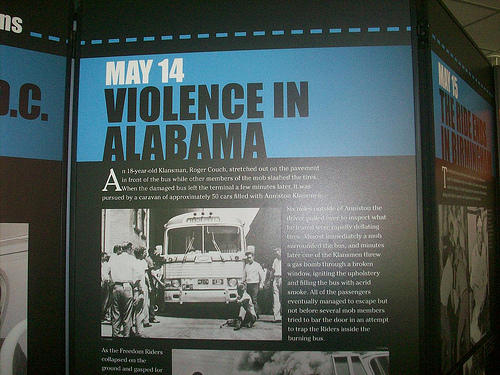
Section Branding
Header Content
Freedom Rides Again
Primary Content

Forty college students, including two from Georgia, are retracing a seminal Civil Rights-era journey. Fifty years divides the two trips, but the students will depart from Washington, D.C., just as the original Freedom Riders did in 1961. As the students prepare for the bus trip, they are learning how much the Freedom Rides changed life in America.
One of the original Freedom riders is Congressman John Lewis. Today Lewis is a distinguished U.S. representative and an elder statesman from the Civil Rights era.
But when the Atlanta Democrat talks about the Freedom Rides, he giddily recalls it as a country boy’s first trip to Washington D.C. Before leaving in May of 1961 for the ride across the South, he ate Chinese food for the first time.
Speaking recently to the Atlanta Press Club, however, he said wanderlust vanished once the bus ride began.
“My seat mate, the two of us rode on a Greyhound bus from Charlotte to a little town called Rock Hill, S.C.," Lewis said in a speech. "And the moment we started through the door of the waiting room marked ‘White Waiting Room,’ a group of men attacked us, beat us, and left us lying in a pool of blood.”
Lewis and the other Freedom Riders were testing a U.S. Supreme Court decision that outlawed segregation in interstate transportation. The group of black and white students set out from Washington to see if they could peacefully ride buses together from town to town in the segregated South.
Mobs of angry white people, often brandishing weapons, met them at many stops. Near Anniston, Ala., white segregationists set fire to the bus.
Kaitlyn Whiteside is one of the two Georgians who will travel from Washington to New Orleans as part of the 50th anniversary remembrance of the rides.
She knows this trip will be different.
“We’re not going to be beaten up," she said in an interview last week. "We’re not going to be firebombed. We’re not going to be imprisoned, and that is just so humbling to me.
Whiteside is about to graduate from Georgia Tech. The Ringgold native, who is white, will attend law school this fall. She says when the original Freedom Riders were preparing for their trip, they were staring down an uncertain future.
“When they signed up to go on this bus, they were literally signing their last wills and testaments," she said. "They thought they were going to die.”
Another trip participant is JoyEllen Freeman, an African American from Milton. She’s researched the Civil Rights movement at the University of Georgia, where she’s an English major. Freeman says that era will take on new meaning after she’s met the people she’s studying.
“Actually being able to go to the place where it happened and to have to accept it and to talk to the person it happened to….it’s interesting," Freeman said. "You’re like, ‘I can’t really relate.’ But I’m going to try and I’m going to try to understand.”
Congressman Lewis said he knows it’s a challenge today for people to understand the Civil Rights era.
“And I think today young people and people not so young never give it a thought," Lewis said after his Atlanta Press Club talk. "They never think about the fact that people couldn’t be seated together, couldn’t eat together.”
Freeman is already thinking about the way things were. And she predicts the trip will change how she approaches civil rights issues of today.
“I think it’s going to give me a refresher and a new meaning for what it’s means to be a human, to be connected to other humans, to be a protector and a fighter, not just for American civil rights but for human rights," Freeman said.
All Americans can join the journey because the students will be snapping photos, producing videos and sharing their impressions via Twitter and Facebook.
For more information: You can see a documentary about the original Freedom Rides on GPB on May 16. You can also follow the students’ journey by visiting PBS.org/freedomriders.
Tags: U.S. Supreme Court, John Lewis, Freedom Rides, 50th anniversary of the Freedom Rides, segregation
